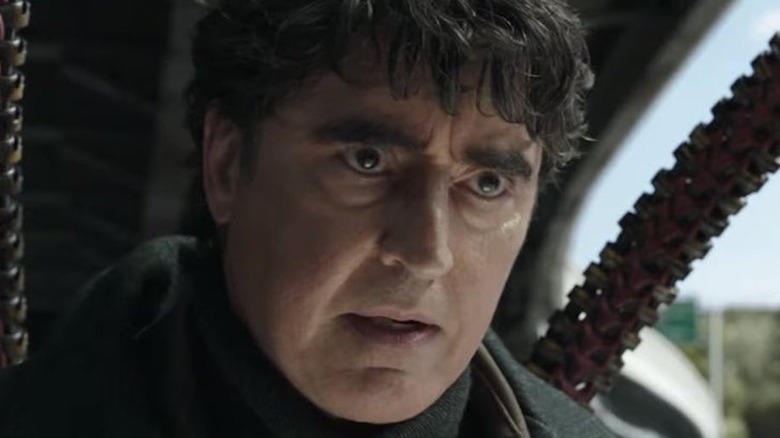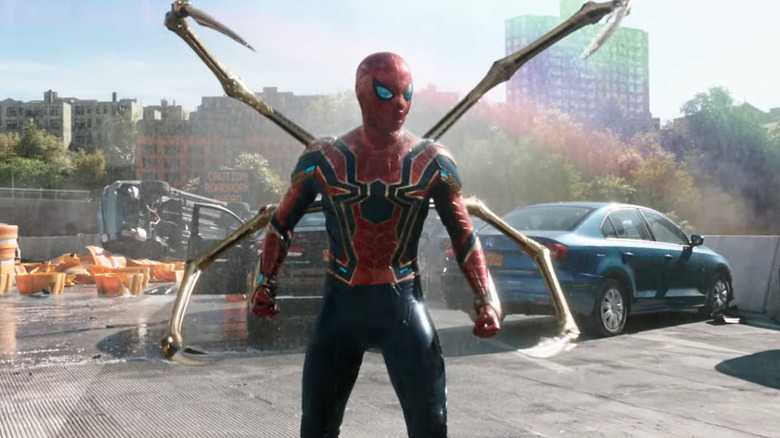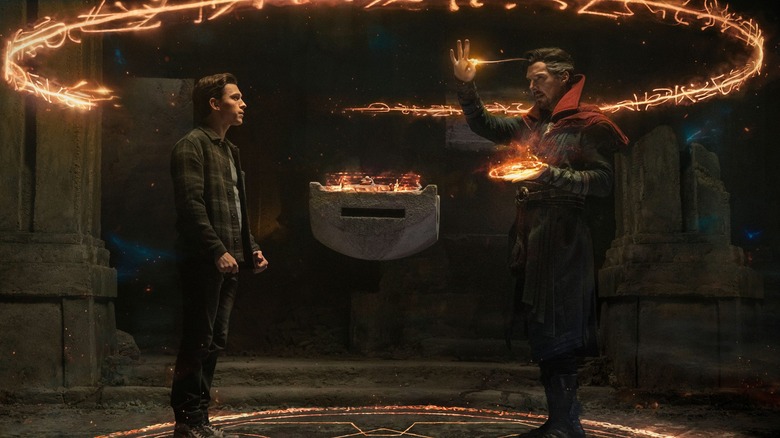Where Does Spider-Man: No Way Home Fit Into The MCU Timeline?
With the arrival of "Spider-Man: No Way Home," we're now 27 movies deep in the Marvel Cinematic Universe. Twenty freaking seven. In what feels like the blink of an eye, we've downed over 13 years of MCU content — a majority of which has been very satisfying. The further we chug along into this juggernaut, the more confusing the timeline can be. Throw in four live-action series, an animated show, and a pandemic that shifted premiere dates, and you might be wondering just how every story you've been served up lands chronologically.
When it comes to the MCU, 2021 is easily the most confusing when it comes to where things land in the timeline. For the film side of things, the year kicked off with "Black Widow," a prequel set after the events of "Captain America: Civil War" and before "Avengers: Infinity War." The subsequent films and series that followed — and some that came before — make the chronology all the more confusing.
Thankfully, Disney+ has the entire MCU timeline laid out on its platform. Easy enough, right? Not so much. The whole Sony thing throws a wrench in that timeline layout, so all the "Spider-Man" movies are left off that chronology. Don't worry, that's what we're here for. Here's where "No Way Home" fits into the MCU timeline.
What happened post-Blip?
"Spider-Man: Far From Home" lands in Phase Three of the Marvel Cinematic Universe, but chronologically, it plays more like a Phase Four film. Don't let the phases of the MCU confuse you. According to the timeline order on the Disney+ website, the events following "Avengers: Endgame" fall in this order chronologically: "Loki," "What If...?," "WandaVision," "The Falcon and the Winter Soldier," "Shang-Chi and the Legend of the Ten Rings," then "Hawkeye." "Eternals" is noticeably absent, as it's not available to stream yet — but we'll get to that.
Figuring that the two "Spider-Man" films that came post-Blip, here's how things line up. With "Far From Home" landing around eight months after "Endgame," that puts it in the late spring or early summer of 2024. Peter's (Tom Holland) school year is just coming to a close, and "No Way Home" picks up immediately after. Kevin Feige and Tom Holland have both confirmed this (via Collider), and it was further proven when some synopses and breakdowns of the film suggest Peter is trying to get him and the gang into MIT.
Where does No Way Home fall in the MCU timeline?
According to "Eternals" producer Nate Moore (via Comic Book), that film "could" take place at the same time as "Far From Home," meaning "No Way Home" is likely set after. We need to accept as MCU fans that when it comes to the chronology, everything doesn't take place one after the other. A lot of things in each film are happening simultaneously, which was a major trend in the 2021 slate.
One definite thing is that "Spider-Man: No Way Home" lands before "Hawkeye," which is set just before Christmas in 2024. Initially, it was revealed "Hawkeye" actually took place in 2025, but director Rhys Thomas cleared the confusion up on Twitter.
Taking everything into consideration, here's a reasonably solid chronology for the movies and series' events that came after "Avengers: Endgame."
- "WandaVision" — approximately three weeks after "Endgame"
- "The Falcon and the Winter Soldier" — approximately six months after "Endgame"
- "Shang-Chi and the Legend of the Ten Rings" — approximately six to eight months after "Endgame"
- "Spider-Man: Far From Home" and "Eternals" — approximately eight months after "Endgame"
- "Spider-Man: No Way Home" — approximately eight to nine months after "Endgame"
- "Hawkeye" — approximately 14 months after "Endgame"
Keep in mind that "Loki" happens in a place out of time, so putting it on the timeline doesn't make much sense. The same can be said for "What If...?" which doesn't have a defining moment in time in the MCU. At this time, it's best if we all embrace the notion that some things in the sacred timeline are just up in the air.


